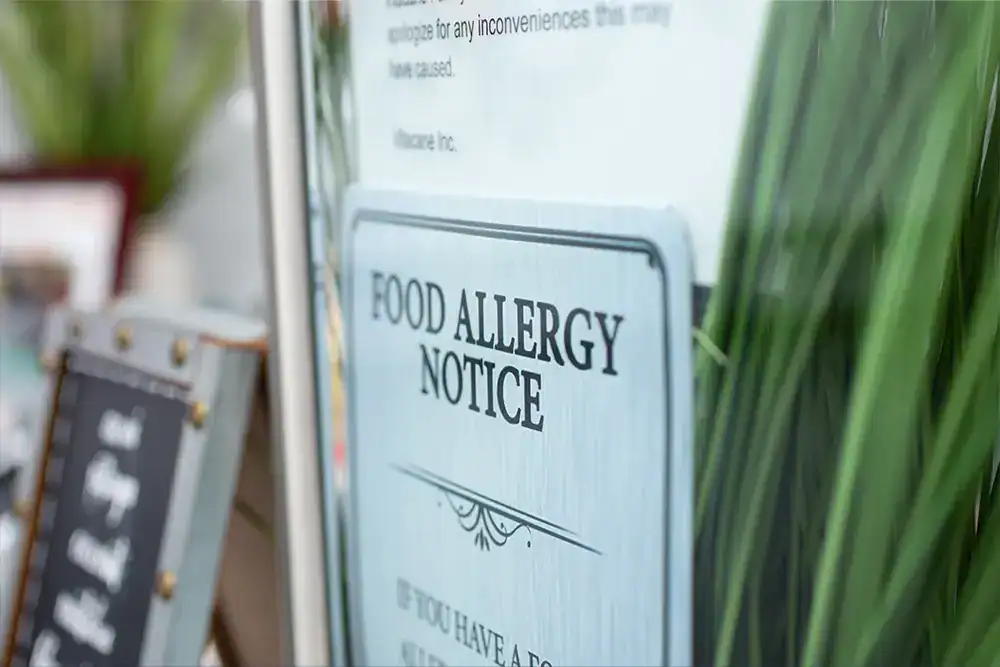Owen’s Law is proposed legislation that would change the way restaurants handle food allergies.
If passed, it would require restaurants to clearly label allergens on their menus and take other steps to protect customers with food hypersensitivities.
While there’s no current expectation to comply, it’s looking likely that Owen’s Law will be implemented in some form.
This guide explains what supporters of Owen’s Law want and explores the implications for food businesses and their customers.
Owen’s Law is the name given to potential new legislation requiring restaurants to clearly label allergens on their menus.
It’s named for Owen Carey, who died in 2017 after suffering a fatal allergic reaction to a chicken burger served in a London restaurant.
Despite assurances from staff that the chicken would be safe for Owen, it was, in fact, cooked in buttermilk – one of his multiple food hypersensitivities.
Since his death, Owen’s family has campaigned to “protect and save the lives of allergy sufferers dining out in restaurants” by bringing in stronger allergen labelling requirements for food businesses.
At the time of writing, these requirements have not been passed into law. However, they have been debated in Parliament.
The Food Standards Agency (FSA), which enforces the overarching legal framework for food safety in the UK, has also signalled support for parts of the proposed legislation.
The UK has already strengthened allergen rules once before. In 2016, 15-year-old Natasha Ednan-Laperouse died after eating a ready-made sandwich that contained sesame not listed on the label.
Her family’s campaign led to Natasha’s Law, which requires all prepacked food for direct sale to display a full ingredients list with allergens clearly highlighted.
Owen’s Law wants to see similar progress on food served in restaurants.
Campaigners, led by Owen Carey’s family, are calling for changes to the way allergens are labelled and communicated in restaurants. There are three main parts to this:
Under Owen’s Law, restaurants would need to clearly mark dishes that contain the 14 named allergens. This requirement would apply to both physical and digital menus.
The format for this labelling hasn’t been decided, but campaigners want the industry to adopt standardised warnings so there’s no risk of confusion between restaurants.
On top of menu labelling, restaurants would need to provide a complete list of ingredients for every dish.
This information would be set out in an allergen matrix to make it clear which items were high risk for people with severe food allergies.
The inquest into Owen’s death found miscommunication between front-of-house and kitchen staff was a contributing factor. Campaigners want stricter controls to prevent this in future.
Currently, the burden is on customers to ask about allergens. Owen’s Law would shift that duty to staff and require servers to ask every customer about allergies when taking orders.
If a customer declares an allergy, the duty manager would have a legal responsibility to step in and directly supervise the order. They would need to verify that the customer’s allergy is correctly recorded and understood by the kitchen staff.
Failure to do this could be treated as a legal offence.
Alongside the proposed legislation, campaigners have also highlighted ways the restaurant industry itself could improve allergen safety.
These aren’t legal requirements, but steps that could reduce risks for customers with food allergies:
Food businesses have an existing duty to provide suitable food allergy training, but campaigners want this taken further.
They believe that enhanced training for waitstaff would reduce the risk of potentially life-threatening mistakes. Campaigners especially want to see these improvements in fast food restaurants and workplaces with high staff turnover.
Duty managers could be required to complete certified training in allergy awareness and first aid. With this certification, they could better supervise junior staff in high-risk situations and help customers suffering from anaphylactic shock.
Large chains could use digital databases alongside the proposed allergen matrices. These would allow customers with allergies to quickly filter and identify safe meal options.
Smartphone apps linked to these databases would make this information more accessible to customers and easier to update across restaurant chains.
A proposed industry-wide allergen ID card, bracelet or necklace could allow servers to instantly identify a customer’s allergies without needing to ask. This would be especially helpful in noisy environments or where language barriers exist.
The Food Standards Agency has expressed broad support for the principles behind Owen’s Law.
While the legislation has not yet been passed, the FSA has already taken action in response to Owen’s death. It has also outlined areas for further progress.
The FSA agrees that clearer written allergen information would benefit both businesses and customers, and that servers should take the initiative to ask about allergies when taking orders.
The agency has also backed calls for better allergen management training for restaurant staff.
Since Owen’s death, the FSA has:
- Updated allergen management guidance and training for businesses
- Launched campaigns encouraging young people to ask about allergens when eating out
- Trialled a “near miss” reporting tool for people with food hypersensitivities
- Conducted research into how customers and businesses exchange allergen information
- Hosted annual Food Hypersensitivity Symposia to share best practices and the latest evidence
Owen’s Law has been debated in Parliament (most recently in 2023), but no bill has yet been introduced. As the legislative process hasn’t formally started, it’s likely to be several years before any new requirements come into force – if they do at all.
With this said, the FSA has signalled its willingness to work with the government and campaigners on how the proposals could be implemented.
Outside of Owen’s Law, food workers still need to be appropriately trained on handling allergens. What’s appropriate depends on the workers’ role, but training must cover the 14 named allergens and the risks of cross-contamination.
Our online Food Allergen Training provides this essential knowledge. It’s suitable for any worker who prepares, handles or serves food and explains:
- Risks associated with the 14 named allergens
- Legal requirements and labelling guidelines for food allergens
- How food safety management systems prevent cross-contamination
Whether Owen’s Law is enforced in full or not, you have a duty to train your staff now. Enrol today to ensure they understand safe procedures for handling allergens and protecting customers.























